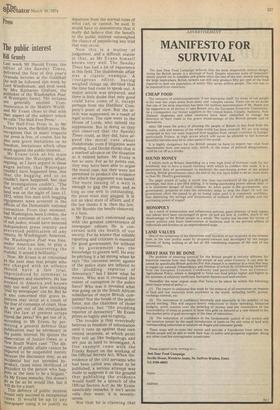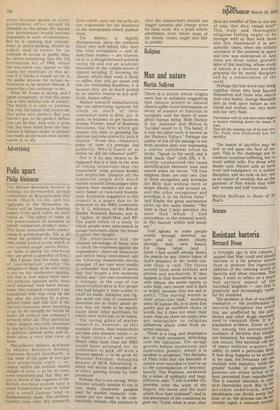Press
The public interest
Bill Grundy
Last week Mr Harold Evans, the editor of the Sunday Times, delivered the first of this year's Granada lectures at the Guildhall (he will be followed this week by Lord Windlesham, and next week by Mrs Katherine Graham, the Publisher of the Washington Post, of Watergate fame). The lectures are generally entitled 'Communication in the Modern World,' and Mr Evans chose to deal with that aspect of the subject which he calls 'The Half-Free Press.'
The Half-Free Press is, in Mr Evans's book, the British press. He recognises that in many respects our press is free, of course, but he also sees grave limitations on its freedom, limitations which often Work against the public interest.
Mr Evans took as his main Illustration the Watergate affair, arguing, as I have argued in these Pages before, that Watergate couldn't have happened here. Not that the bugging and so on couldn't have happened, but that the investigations couldn't. "The first whiff of the scandal in the land was on the night of June 17, 1972, when five men with bugging equipment were arrested in the Offices of the Democratic national committee. From that moment, had Washington been London, the rules of contempt of court, the cry of sub judice, would have deterred Independent press inquiry and Prevented publication of any results. In Washington, however, the Washington Post was free, under American law, to play a Major role in uncovering the scandal. It seized it brilliantly." Now, Mr Evans is as concerned as the next man that people who .are charged with an offence Should have a fair trial, unprejudiced by comment' in newspapers and elsewhere. He has worked in America and knows Prily too well just how shocking Plat by newspaper' can be. But he also concerned that grave injustices may occur as a result of the fear of contempt of court. How do we get out of the straitjacket that the law at present straps CgtIndAhe press? We get out of it, according to Mr Evans, by perMating a general defence that Publication may be necessary in the public interest. He quotes the observation of Justice Owen in a INIeW South Wales case: "The dis
cussion of public affairs cannot be required to be suspended merely because the discussion may, as an
incidental but not intended byproduct, cause some likelihood of
Prejudice to the person who hapPens at the time to be a litigant." As Mr Evans remarks, this doesn't gc> as far as he would like, but it Will do for a start.
This defence of public interest Would only succeed in exceptional cases. It would be up to any r!ewspaper using it to justify its departure from the normal rules of what can, or cannot, be said. It would have to demonstrate that it really did believe that the benefit to the public interest outweighed the chance of pcejudicing any trial that may occur.
Now this is a matter of judgement, and a difficult matter at that, as Mr Evans himself knows very well. The Sunday Times has had a lot of experience in this field. The thalidomide affair was a' classic example. A courageous editor, having weighed things up, decided that the time had come to speak out. A major article was prepared, and there is little doubt that only good could have come of it, except perhaps from the Distillers' Company's point of view. But the article was suppressed, as a result of legal action. The case went to the House of Lords, who upheld the suppression. But in doing so they also observed that the Sunday Times could, as they did, have argued the moral case about thalidomide, even if litigation were pending. Lord Devlin thinks that is a marked advance on the situation as it existed before. Mr Evans is not so sure. For as he points out, they may have been able to argue the moral case, but they were not permitted to produce the evidence on which the argument was based. The mere issuing of a writ is. enough to gag the press, and as long as one writ is outstanding, the press must stay gagged. It is not an ideal state of affairs, and if the law thinks it is, then the law, as Mr Bumble the beadle observed, is a hass.
Mr Evans isn't concerned only with the greater convenience of newspaper editors. He is concerned with the health of our society. For he knows that reliable reporting and criticism is essential for good government, for without it no government has the knowledge to govern well. He may be pitching it a bit strong when he says "the cleverest secret agents of the police state are inferior to the plodding reporter of democracy," but I know what he means. Who was it revealed the extent of corruption in the police force? Who was it revealed what was going on in the South African subsidiaries of major British companies? Not the heads of the police force, not the chairmen of those companies, but "the plodding reporter of democracy" Mr Evans prizes so highly and so rightly. The trouble is that everybody believes in freedom of information until it runs up against their own vested interests, at which point they roll up like hedgehogs and are just as hard to investigate. A fine example came with the Franks Report on the working of the Official Secrets Act. When the evidence of the civil servants who had been called was about to be published, a serious attempt was made to suppress it on the ground that publishing the evidence would itself be a breach of the Official Secrets Act! As Mr Evans caustically remarks, it isn't seven veils they want; it is seventyseven.
Not that he is claiming that every internal memo in every government office should be released to the press. He knows that government would become impossible in such circumstances. But he is claiming that concealment in policy-making should be ended. And in return for an increase in access to public files, he offers something like the US Information Act of 1966, where the executive can appeal to the courts for restriction of that access if it thinks it would not be in the public interest for certain information to be bruited abroad. It seems like a fair exchange to me.
What Mr Evans is saying, and I agree completely, is that the press has a very definite role in society. The better it is able to perform that role, the better will society be. Our press isn't perfect. But you haven't got to be perfect before you can be free. And only a press that has been freed from the limitations it labours under at present can really do the work that society needs it to do.



































 Previous page
Previous page